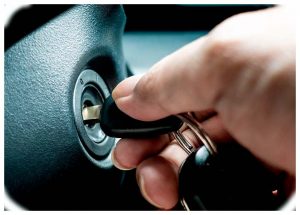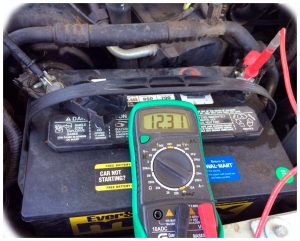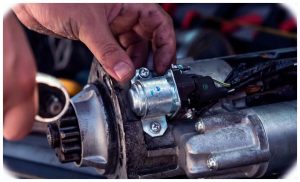If your vehicle’s power goes out when you turn the ignition, it can be an extremely frustrating experience. Understanding what might be causing the problem and how to diagnose and fix it can save you time and money in the long run. This guide will discuss what happens when you turn the ignition and examine common causes of power loss with repair solutions.
How Does The Ignition System Work?
The purpose of an automobile’s ignition system is to generate a spark that ignites a mixture of fuel and air for combustion to take place in an internal combustion engine. The process begins with an electric current entering a coil primary winding, generating an electromagnetic field that induces a current into a secondary winding. This current then passes through an isolation device such as a spark plug wire or distributor cap, which carries it back into another coil winding, which is boosted before being sent out through the spark plug gap as high voltage electricity capable of creating sparks.
What Happens When You Turn the Ignition?
When you turn the key in the ignition, a few things happen. First, an electric current is sent to the starter motor to spin its internal flywheel, which cranks up and starts your engine. After that, power is sent to the alternator to produce electricity for car systems such as headlights and other accessories. Lastly, fuel is drawn from the fuel tank and delivered to the engine through fuel injectors or a carburetor.
Common Causes of Power Loss When Turning Ignition
There are several common causes of power loss when turning the ignition:
Battery Issues – A weak or dead battery can cause a vehicle to fail to start or have issues with power when turning on the ignition. Common symptoms of poor battery performance include slow crank times or intermittent starting issues. If your battery is over three years old, you may need to replace it with a new one.

Bad Starter – When a starter motor fails, it typically causes a loud clicking or grinding noise when attempting to start your vehicle. The car may also fail to turn over and start even after multiple attempts.
Clogged Fuel Filter – A dirty fuel filter can cause the engine not to receive enough fuel, resulting in difficulty starting or stalling out shortly after the engine has started up and power is turned on.
Malfunctioning Ignition Switch – An ignition switch that fails will cause the vehicle to shut off or lose power when the ignition is turned on. This can be caused by a broken wire or defective switch and should be inspected and repaired immediately.
How To Diagnose The Problem
If you are experiencing power loss while turning your car’s ignition, there are several steps you can take to diagnose the problem:
-
Check your battery by performing a voltage test with an appropriate digital voltmeter or multimeter – if it reads below 12 volts, then you likely need to replace it;
-
Check for any loose wires and connectors that could be causing an issue with the circuit;
-
Inspect the alternator for any signs of damage or corrosion;
- Check the starter motor for any signs of wear or damage;
-
Inspect the fuel filter for dirt and debris, and replace if necessary;
-
Test the ignition switch with a continuity tester.
Solutions to Fix Power Loss When Turning Ignition
Once you have identified the cause of power loss when turning your vehicle’s ignition, here are some potential solutions:
Jumpstarting Your Battery – If you have determined that your battery is at fault, you may be able to jumpstart it with a set of jumper cables to get it going again. Make sure to follow all safety precautions when doing so.
Replacing the Alternator – If an issue has been identified as the cause of power loss, it will need to be replaced for your car to run properly again.
Repairing or Replacing the Starter – If a bad starter is causing problems with power loss when turning on the ignition, it will need to be either repaired or replaced for your vehicle to start up properly again.
Replacing The Fuel Filter – A clogged fuel filter can cause a vehicle to have difficulty starting, so if this is the source of your issues, you will need to replace the fuel filter.
Fixing or Replacing the Ignition Switch – If a malfunctioning ignition switch is causing power loss when turning your car’s ignition, it may need to be either repaired or replaced for it to start properly again.
Preventive Measures To Avoid Future Power Loss
In addition to troubleshooting and fixing any current power loss when turning your car’s ignition, some preventive measures can help avoid future problems:
-
Have your car’s battery tested regularly and replace if necessary;
-
Check all wiring connections regularly;
-
Inspect alternator for damage or corrosion;
-
Regularly check and inspect the starter motor for wear or damage;
-
Clean the fuel filter at least once every year;
-
Have the ignition switch tested and repaired/replaced as needed.
Conclusion
Having issues with power loss when turning your vehicle’s ignition can be frustrating, but with the right steps, you should be able to troubleshoot and diagnose what is causing the issue. This article has provided an overview of the ignition system, what happens when you turn the key in the ignition, common causes of power loss when turning the ignition, how to diagnose the problem, solutions to fix power loss when turning the ignition, and preventive measures to avoid future power losses. It happens that your Ford Focus key does not turn, read more about this here. With this knowledge and tips in mind, you should be able to get your car back up and running in no time.





 Check your battery by performing a voltage test with an appropriate digital voltmeter or multimeter – if it reads below 12 volts, then you likely need to replace it;
Check your battery by performing a voltage test with an appropriate digital voltmeter or multimeter – if it reads below 12 volts, then you likely need to replace it; Have your car’s battery tested regularly and replace if necessary;
Have your car’s battery tested regularly and replace if necessary;
Add Comment